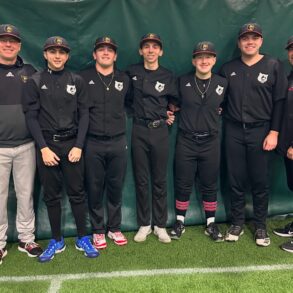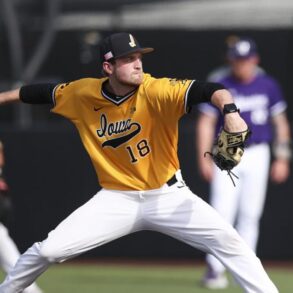Image credit:
Alberto Osuna (Brian Westerholt/Four Seam Images)
Two weeks after transferring to Tennessee and applying for a waiver for immediate eligibility, first baseman and designated hitter Alberto Osuna has taken his case to federal court.
The complaint is viewed as an escalation as Osuna pursues another season of collegiate eligibility. He also filed a motion for a temporary restraining order and preliminary injunction.
The 6-foot-1, 240-pound slugger, who was expected to play for Division II Tampa as a graduate student this year, joined the Volunteers two weeks before the start of the 2025 season. Pending the approval of an eligibility waiver, which Tennessee still expects to receive according to multiple sources, Osuna will almost certainly contend for a starting role.
He remains enrolled in classes at Tennessee.
“As of now, I think he’s waiting for clearance to be eligible,” Tennessee head coach Tony Vitello told reporters during a preseason media availability on Tuesday. “I don’t even know of the specific terms. And the one good thing is to come in, you know, halfway through the year and get everybody to like you and be on board with who you are, is not easy. But if you’re around that kid, you’ll see why it’s easy for him. He’s an incredible kid.”
The move is a byproduct of the NCAA’s Dec. 23 decision to approve a blanket waiver granting an additional year of eligibility to former junior college transfers who previously “competed at a non-NCAA school for one or more years” and otherwise would have exhausted their NCAA eligibility following the 2024-25 season.
Osuna transferred to Tampa over the offseason after three years at North Carolina, where he used up his D-I eligibility. He began his collegiate career at Walters State Community College in 2020.
Osuna enjoyed a great deal of success throughout his stint in Chapel Hill, where he ranks fifth all-time in career home runs (45). Last year, the slugger hit .281/.376/.537 with 14 home runs, 56 RBIs and 17 doubles, a new career high. He also set career-best marks in runs scored (43), total hits (65), walks (33) and strikeout percentage (20.6%). Osuna appeared in all 62 of the Tar Heels’ games, including in the College World Series where he faced the Volunteers.
The Mauldin, SC native made a name for himself in 2021 at Walter State when he won NJCAA D-I player of the year honors. Osuna, who played 19 games in the COVID-shortened 2020 season, hit .459 with 25 home runs and a nation-leading 107 RBIs.
Osuna is the latest college athlete aiming to take advantage of NCAA’s waiver policy, which came on the heels of a mid-December court ruling that granted Vanderbilt quarterback Diego Pavia an extra year of eligibility.
Pavia’s attorney’s successfully argued that argued that the NCAA’s rule, which counts a player’s time in junior college toward his overall years of NCAA eligibility, violated antitrust laws and unfairly limited his ability to profit from his name, image and likeness.
Osuna’s complaint argues that the only difference between him and the Vanderbilt signal caller is that he plays a spring sport.
Vitello echoed that sentiment Tuesday.
“I think the only difference in his case from the one that took place in the winter (Pavia) is that he plays baseball and the other guy plays football,” he said.
Many Division I coaches expressed to Baseball America that they feared the Pavia ruling’s impact on college baseball, arguing that it threatened the actively accepted framework for team building.
“Part of me was like, ‘Oh, this could be an advantage because you can get a two-year JUCO player who only counts as a freshman,” a high-major coach told BA. “I think that part is cool and can obviously help you win. But then there’s the other part of me that’s like, ‘This is absolutely ridiculous. At what point does someone get a hold of this thing?”
College roster makeup was already in a state of flux prior to the Pavia ruling.
Division I programs will see their rosters trimmed from 40 players to 34 beginning in 2025-26, a rollback from the temporary expansion implemented to accommodate the surge of players who received an extra year of eligibility after the Covid-shortened 2020 season.
To complicate matters, coaches might be allowed to carry 38 players during the fall but will be required to cut them down to 34 by Dec. 1, which all but guarantees a flood of mid-year transfer portal entrants, even though current rules stipulate that they’d be ineligible for the spring season.
It’s all contributing to rising concern across coaching community.
“We already have a number of significant friction points with the NCAA in college baseball,” a second high-major coach told BA. “The new roster rules aren’t clear enough. NIL is out of control and threatening the competitive balance throughout our sport. Eligibility is no longer a straight-forward topic. So, really, I think you can just add the Pavia stuff to the list. We have more questions than answers, and a lot of us feel that way for sure.”
This post was originally published on this site be sure to check out more of their content.







